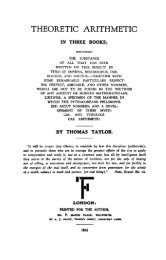The Mystical Hymns of Orpheus - Platonic Philosophy
The Mystical Hymns of Orpheus - Platonic Philosophy
The Mystical Hymns of Orpheus - Platonic Philosophy
Create successful ePaper yourself
Turn your PDF publications into a flip-book with our unique Google optimized e-Paper software.
OF ORPHEUS. 35<br />
<strong>The</strong>e, shepherds, streams <strong>of</strong> water, goats rejoice,<br />
Thou lov'st the chase and Echo's secret voice :<br />
<strong>The</strong> sportive Nymphs thy ev'ry step attend,<br />
And all thy works fulfill their destin'd end.<br />
0 all-producing pow'r, much-fam'd, divine,<br />
<strong>The</strong> world's great ruler, rich increase is thine.<br />
All-fertile Pean, heavenly splendour pure,<br />
In fruits rejoicing, and in caves 32 obscure.<br />
True serpent-horned Jove 33, whose dreadful rage,<br />
When rous'd, 'tis hard for mortals to assuage.<br />
32 A cave, as we are informed by Porphyry De Antr.<br />
Nymph. is an apt symbol <strong>of</strong> the material world ; since it is<br />
agreeable at its first entrance on account <strong>of</strong> its participation<br />
<strong>of</strong> form, but is involved in the deepest obscurity to the in-<br />
tellectual eye, which endeavours to discern its dark f oun-<br />
dation. Hence, like a, cave, its exterior and superficial<br />
parts are pleasant, but its interior parts are obscure; 'nd<br />
its very bottom darkness itself.<br />
33 Pan, as we have already observed, first subsists at the<br />
extremity <strong>of</strong> the intelligible order, and is the same with<br />
Protogonus or Phanes. This being the case, in the intellectual<br />
order he is analogous to Jupiter the Demiurgus, by<br />
whom, according to <strong>Orpheus</strong>, Phanes was absorbed. Hence,<br />
as Jupiter is said to be the mingler <strong>of</strong> all things by <strong>Orpheus</strong>,<br />
as we learn from 10. Diac. Allegor. in Hasiod, p. 305, horns<br />
are an occult symbol <strong>of</strong> the mingling power <strong>of</strong> the Demiurgus<br />
<strong>of</strong> the world. For the literal meaning <strong>of</strong> the word<br />
K E ~ ~ G T ~ S ,<br />
used in this hymn, is horned serpent ; and one<br />
<strong>of</strong> the heads <strong>of</strong> Protogonus is that <strong>of</strong> a serpent. And the<br />
word KEpanqs is, as Gesner observes, derived from the<br />
verb Kepavvvpc, to mingle.

















